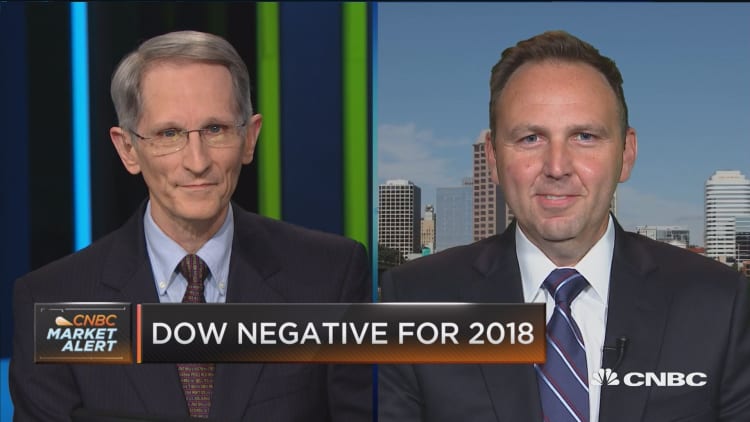
The drop by stocks Tuesday — after the rally where the Dow posted an eight-day winning streak — is a good chance to pick up some defensive stocks, said Jamie Cox, managing partner at Harris Financial Group.
"Even though the economy is charging right along, there's going to be a payback someday," Cox said Tuesday on CNBC's "Power Lunch."
"It's very possible that, with the new tax legislation, and some of the things that are going on, that the economy could go into recession in a couple of years," said the financial advisor. To be more precise, his time frame is one to two years, or by 2020.
As a result, Cox recommended that investors insulate their portfolios with dividend stocks.
Names that "aren't necessarily recession-proof," he said. "But they tend to be resilient."
"Mobile services are a perfect example, because the last thing you're going to do during a recession is turn off your phone," Cox said.
Companies with solid fundamentals are a buying opportunity as interest rates rise and prices drop during sell-offs, he said.
"There's no business condition causing the stocks to fall," Cox said. "It's just the interest rates. So they'll go back up again."
Some sectors to consider are telecom, utilities and consumer staples, Cox said. He recommended Duke Energy, Dominion Energy, AT&T, Verizon and Procter & Gamble.
Cox pointed out that a company like Procter & Gamble was performing badly year to date. "But people need toothpaste," he said.
"Like any other investment," Cox said, "it doesn't necessarily pay off right away. What you're trying to do is build your portfolio for income or whatever you're trying to do for the future."
On Tuesday, stocks fell, with all major indexes opening lower. The Dow Jones industrial average dropped nearly 200 points, the S&P 500 shed 0.7 percent and the Nasdaq composite declined 0.8 percent.
Meanwhile, the benchmark U.S. 10-year Treasury yield, hit its highest level since 2011 on Tuesday, at 3.09 percent.
In addition, many market watchers fear the Federal Reserve will raise interest rates as many as four times this year. The first rate increase in 2018 was after the central bank's March meeting.
But Cox said the likelihood of four hikes is small.
At some point the positive effects for companies from the Republican tax law are going to wear off and some of those corporations "are going to stop buying things," Cox said. "That's going to cause a recession or slowdown in the economy."
He warns investors not to assume, "stocks are going to stay up forever."
"They're not going to," Cox said. "Particularly the high-flying ones. If there is a recession, the things that have been bid up the most are going to get hit the worst."


